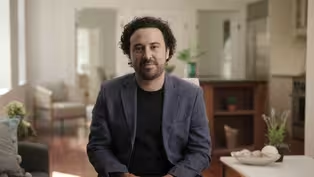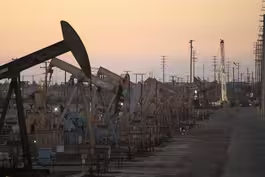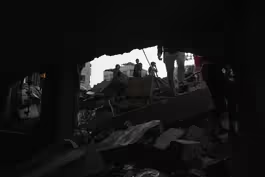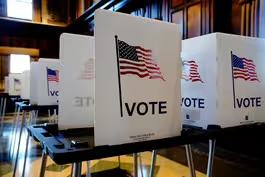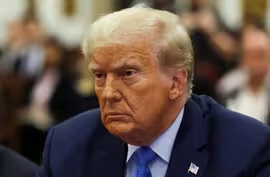
Israel and Hezbollah fight raises fears of a wider war
Clip: 12/28/2023 | 6mVideo has Closed Captions
Escalating tensions between Israel and Hezbollah grow fears of wider outbreak of war
With the Israel-Hamas war in Gaza showing no signs of stopping, exchanges of fire across the Israel-Lebanese border are raising fears of a widening conflict. Geoff Bennett discussed more with Paul Salem, the president and CEO of the Middle East Institute, a Washington-based non-partisan think tank.
Problems playing video? | Closed Captioning Feedback
Problems playing video? | Closed Captioning Feedback
Major corporate funding for the PBS News Hour is provided by BDO, BNSF, Consumer Cellular, American Cruise Lines, and Raymond James. Funding for the PBS NewsHour Weekend is provided by...

Israel and Hezbollah fight raises fears of a wider war
Clip: 12/28/2023 | 6mVideo has Closed Captions
With the Israel-Hamas war in Gaza showing no signs of stopping, exchanges of fire across the Israel-Lebanese border are raising fears of a widening conflict. Geoff Bennett discussed more with Paul Salem, the president and CEO of the Middle East Institute, a Washington-based non-partisan think tank.
Problems playing video? | Closed Captioning Feedback
How to Watch PBS News Hour
PBS News Hour is available to stream on pbs.org and the free PBS App, available on iPhone, Apple TV, Android TV, Android smartphones, Amazon Fire TV, Amazon Fire Tablet, Roku, Samsung Smart TV, and Vizio.
Providing Support for PBS.org
Learn Moreabout PBS online sponsorshipconflict in the Middle East as# tensions with Iran increase.
For that, we turn to Paul Salem, the president and## CEO of the Middle East Institute.
That's# Thank you for being with us.
Mr. Salem, how do you in Israel's former defense minister,# current member of Israel's war cabinet, who is clearly warning about the potential# for military escalation against Hezbollah?
PAUL SALEM, President and CEO, Middle East# Institute: Well, there's been tension between## Israel and Hezbollah from the Re cent reporting indicated that the U.S.# talked Israel down from a preemptive## attack on Hezbollah early in those days.# This tension is coming back center stage.## And the Israelis have made it very clear to the# Americans and to the world that they want some## resolution to parts of the situation on their# northern border with Hezbollah and Lebanon.
Otherwise, they will take military action,# or at least that's what they're threatening.
GEOFF BENNETT: Is Israel capable of starting# and maintaining a two-front war right no PAUL SALEM: Yes, I believe it is# capable of doing that.
Obviously,## that would take a lot of# manpower and a lot of effort.
I think, particularly as they maybe transition# their war in Gaza to a more fo a more targeted campaign, they might have# the capacity to open a second front.
But## the challenge is that Hezbollah has so# much firepower that it could unleash on## Israeli economic infrastructure, civilian# infrastructure, the energy infrastructure,## including offshore gas operations that the# calculation is really not so much can they## wage a war as, rather, can they bear# the brunt and the cost of such a war?
GEOFF BENNETT: Well, tell# us more about Hezbollah's## military capabilities.
What PA UL SALEM: The last war between Israel# and Hezbollah was in 2006, so 17 years ago.
But, since then, Iran has resupplied Hezbollah# with a much larger and a much more accurate## arsenal of missiles, estimated to be well more# than 100,000 missiles.
These are positioned in## various parts of the country.
And they are --# because many of them are precision missiles,## according to reports that one sees from the U.S.# or Israel or elsewhere, that they are able to## target very critical infrastructure in Israel,# as well as civilian infrastructure as well.
And although Israel has an# effective Iron Dome defense system,## that can catch a large number of# missiles, but certainly not all.
GEOFF BENNETT: Does Hezbollah, in your estimation,## want a war?
What is it trying# to sig PAUL SALEM: Hezbollah definitely does# not want a full-scale war, nor does Iran.
Hezbollah has made it clear after the# Hamas attacks on Israel and after the## Israeli attacks on Gaza that it will# maintain a limited level of engagement## or hostility across the border.
In their# telling, it is to pin down some of the## Israeli forces in the north in order# to relieve, as it were, their allies.
And, indeed, they are their allies, Hamas# in the Gaza Strip.
But they have also made## it clear that they do not want a full-scale# escalation or a full-scale war.
Israel also## probably does not want a full-scale war.# The U.S. as well does not want it.
So,## all the parties, I think, are scrambling to find# a way forward, while avoiding a full-scale war.
GEOFF BENNETT: Well, on that point, as# you mentioned the potential path forward,## the U.S. appears determined to find a long-term# political solution to the Is In your view, is that even possible right now?
PAUL SALEM: For the Israel-Hamas conflict,# which that is certainly a very, very# complicated and difficult pathway forward.
It's noteworthy to say that the American# governments and the Israeli governments## are on opposite pages.
The current Israeli# government led by Prime Minister Netanyahu,## which has a lot of the right wing, their plan is# to basically consolidate their occupation of the## West Bank and Gaza, whereas the American plan# is to get over the Gaza war and move towards## open negotiation towards a two-state solution,# so really very different trajectories there.
GEOFF BENNETT: What would the U.S. role# be if -- and we should emphasize the word## if -- this war between Israel and Hamas# escalates into a wider regional conflict?
PAUL SALEM: Well, the U.S. has already made## it clear that that is something# U. S. diplomats, led by Mr. Amos Hochstein, have# been visiting at least Lebanon, li kely place where the conflict could spread,# in order to negotiate between the Israelis and## Hezbollah to avoid a second front to this war,# which would be a front between Israel and Lebanon.
Yemen and the Houthi movement there, which is also# allied with Iran, has been a place where there's## been attacks from the Houthis on shipping along# the Red Sea.
So far, it's been fairly limited.## The U.S. has led a naval operation there to# protect shipping, and most shipping has resumed.
So that is largely, I would say, being# managed.
It's noteworthy that escalation## has not reached the Persian Gulf# itself, which is where much of## the world's energy is exported from.# So far, that remains to be the case.
GEOFF BENNETT: Paul Salem is president# and CEO of the Middle East Institute.
Thank you for your insights this evening.
PAUL SALEM: Thank you.
A Brief But Spectacular take on music empowering communities
Video has Closed Captions
Clip: 12/28/2023 | 3m 15s | A Brief But Spectacular take on how music empowers communities (3m 15s)
How U.S. oil production reached an all-time high in 2023
Video has Closed Captions
Clip: 12/28/2023 | 7m 14s | How U.S. oil production reached an all-time high in 2023 (7m 14s)
Israeli bombardment of Gaza cities and camps kills dozens
Video has Closed Captions
Clip: 12/28/2023 | 3m 27s | Israeli bombardment of Gaza cities and refugee camps continues, killing dozens (3m 27s)
Physician discusses demand for weight-loss drugs and risks
Video has Closed Captions
Clip: 12/28/2023 | 7m 59s | Physician discusses surge in demand for weight-loss drugs and risks in using them (7m 59s)
State ballot measures could drive voter turnout in 2024
Video has Closed Captions
Clip: 12/28/2023 | 4m 35s | State ballot measures in 2024 could drive voter turnout and change the future of elections (4m 35s)
Trump's criminal and civil cases could shape the campaign
Video has Closed Captions
Clip: 12/28/2023 | 5m 45s | How Trump's criminal and civil cases could shape the 2024 campaign (5m 45s)
The war over fake content linked to Israel-Hamas conflict
Video has Closed Captions
Clip: 12/28/2023 | 8m 22s | The online information war over fake content linked to Israel-Hamas conflict (8m 22s)
Providing Support for PBS.org
Learn Moreabout PBS online sponsorship
- News and Public Affairs

FRONTLINE is investigative journalism that questions, explains and changes our world.

- News and Public Affairs

Amanpour and Company features conversations with leaders and decision makers.












Support for PBS provided by:
Major corporate funding for the PBS News Hour is provided by BDO, BNSF, Consumer Cellular, American Cruise Lines, and Raymond James. Funding for the PBS NewsHour Weekend is provided by...
